Buy THYROMAZOL Online For Sale
$13.00
ACTIVE SUBSTANCE: METHIMAZOLE
FORM: 100 PILLS X 5 MG
MANUFACTURER: ABDI IBRAHIM
Thyromazol is a medication used to treat hyperthyroidism, which is a condition where the thyroid gland produces too much thyroid hormone. It belongs to a class of drugs called antithyroid agents, which work by inhibiting the production of thyroid hormones. Thyromazol is available in the form of tablets and is usually taken orally.
Composition:
The active ingredient in Thyromazol is methimazole. Each tablet contains 5 mg or 10 mg of methimazole as the active ingredient. In addition, the tablets may also contain other inactive ingredients, such as corn starch, lactose monohydrate, and magnesium stearate.
Uses:
Thyromazol is primarily used to treat hyperthyroidism that is caused by an overactive thyroid gland or Graves’ disease. In some cases, it may also be used to prepare patients for radioactive iodine therapy or thyroidectomy.
Usage and Dosage:
The dosage of Thyromazol depends on the severity of hyperthyroidism and the patient’s response to the medication. The initial dose is usually 15-60 mg/day, which is divided into two or three doses taken throughout the day. After several weeks, the dose may be reduced to 5-15 mg/day as a maintenance dose.
It is essential to follow the dosage instructions provided by the doctor carefully. The tablets should be taken with water, preferably at the same time each day. It is not recommended to suddenly stop taking the medication without consulting with the doctor.
Storage Conditions:
Thyromazol should be stored in a cool, dry place at room temperature. The tablets should be kept away from moisture, heat, and direct sunlight. It is also essential to keep the medication away from children and pets.
Mechanism of Action:
Thyromazol works by inhibiting the production of thyroid hormones in the thyroid gland. It does this by blocking the action of an enzyme called thyroperoxidase, which is necessary for the production of thyroid hormones. This results in a decrease in circulating thyroid hormones, leading to the treatment of hyperthyroidism.
Contraindications:
Thyromazol is contraindicated in patients who are allergic to methimazole. It is also not recommended for use in pregnant women or those who are breastfeeding. Patients with liver or kidney disease, blood disorders, or a history of bone marrow suppression should be monitored carefully while taking Thyromazol. It is also not recommended for patients with a history of agranulocytosis (a severe and potentially life-threatening blood disorder) caused by methimazole.
Side Effects:
The most common side effects of Thyromazol include:
– Nausea and vomiting
– Headaches
– Dizziness
– Loss of taste or smell
– Joint pain
– Hair loss
– Skin rash
– Itching
Less common side effects include:
– Agranulocytosis (a severe and potentially life-threatening blood disorder)
– Hepatitis
– Pancreatitis
– Hypothyroidism (low thyroid hormone levels)
– Skin reactions, such as Stevens-Johnson syndrome or toxic epidermal necrolysis (serious skin conditions that can be life-threatening)
Conclusion:
Thyromazol is a medication used to treat hyperthyroidism caused by an overactive thyroid gland or Graves’ disease. It works by inhibiting the production of thyroid hormones. The dosage of Thyromazol depends on the severity of hyperthyroidism and the patient’s response to the medication. It should be stored in a cool, dry place at room temperature. Patients with liver or kidney disease, blood disorders, or a history of bone marrow suppression should be monitored carefully while taking Thyromazol. It is also essential to be aware of possible side effects and to contact the doctor if any arise.
4 reviews for Buy THYROMAZOL Online For Sale
Add a review Cancel reply
Related products
Pharmaceutical
Pharmaceutical
Pharmaceutical
Pharmaceutical


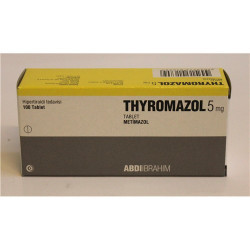
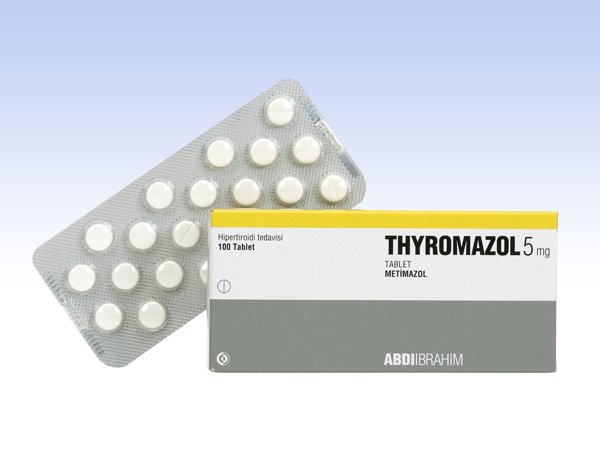
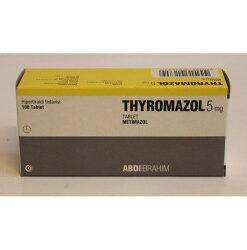
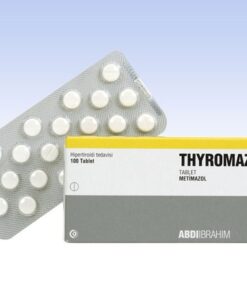
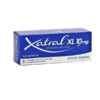

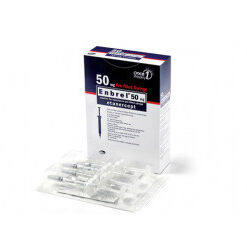


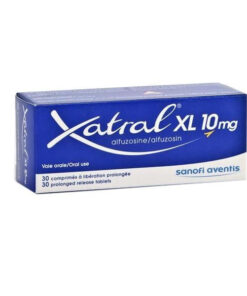
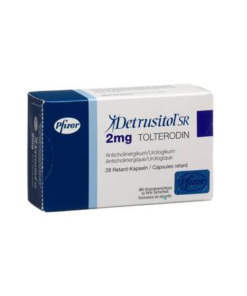
James B. –
I have been very pleased with Thyromazol 5 mg for controlling my hyperthyroid symptoms. The methimazole works quickly and effectively to balance my thyroid levels, leading to noticeable improvements in energy and overall well-being.
The 100-pill pack is excellent value and convenient for ongoing treatment. The tablets are easy to swallow and consistent in quality. Manufactured by Abdi Ibrahim, this medication is clearly made to high standards and has never let me down.
For anyone seeking a dependable treatment for hyperthyroidism, I strongly recommend Thyromazol 5 mg. It’s a reliable choice that truly makes a difference.
Robert –
Thyromazol 5 mg has been an essential medication in managing my hyperthyroidism. The methimazole tablets are potent and have helped me maintain stable thyroid hormone levels with minimal side effects.
I appreciate the generous 100-pill packaging, which is both practical and economical for long-term use. The product’s consistency and quality reflect the high standards of Abdi Ibrahim as a manufacturer.
Overall, Thyromazol has made a positive difference in my health, improving my symptoms and quality of life. I highly recommend it to anyone under medical guidance needing effective thyroid regulation.
xXOutbackXx –
I have been using Thyromazol 5 mg for several months now, and it has significantly improved my thyroid condition. The methimazole formulation is effective in controlling my symptoms of hyperthyroidism, helping me feel more balanced and energetic.
The 100-pill pack is very convenient, providing a good supply for ongoing treatment. The tablets are easy to take and consistently well-made. I trust Abdi Ibrahim as a manufacturer, and this medication meets all my expectations in terms of quality and effectiveness.
If you are looking for a reliable and affordable option to manage hyperthyroidism, Thyromazol 5 mg is an excellent choice. Highly recommended!
Doctorsid –
Thyromazol 5 mg, containing Methimazole, has been a crucial part of my treatment for managing hyperthyroidism. The medication works efficiently to regulate thyroid hormone levels, helping to reduce symptoms like palpitations, anxiety, and weight loss.
The 5 mg dose is easy to adjust based on my doctor’s recommendations, and having 100 pills per package is both convenient and cost-effective for long-term therapy. The tablets are consistent in quality and potency, ensuring steady and reliable control of thyroid function.